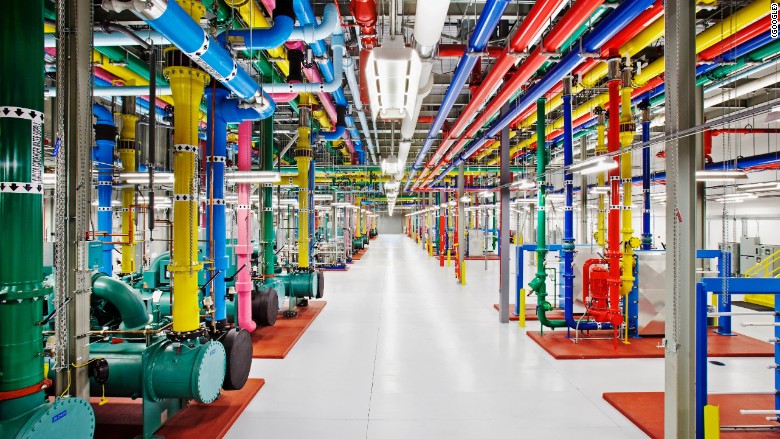
With the push of a button this spring -- Google was instantly using 40% less energy to cool a handful of its data centers.
The achievement, which Google (GOOG) hails as a major breakthrough, points to how artificial intelligence can be used to make data centers, power plants, energy grids and manufacturing plants more efficient. As these huge, energy-intensive operations use power more efficiently, fewer greenhouse gases are emitted.
"We're really thrilled about the environmental impact," said Mustafa Suleyman, who leads applied AI at Google DeepMind, a group of London researchers behind the project.
DeepMind has leapt to prominence by building computer systems capable of mastering everything from Atari games to the board game Go. It's also exploring way to detect diseases earlier by analyzing medical data.
Related: A Google computer victorious over the world's 'Go' champion
To achieve the 40% drop in cooling costs -- which translates to a 15% boost in power efficiency -- DeepMind used deep learning, a trendy type of artificial intelligence in which computers recognize patterns in large data sets.
DeepMind's computer systems looked at information from the thousands of sensors in each data center, and realized tweaks could be made to save energy. For example, a water chiller might be turned off for 20 minutes or even a few hours. Or the temperature might be adjusted by a few degrees. The system learns from experience what specific tweaks are best for a given situation.

Google said its data centers are too complicated for traditional engineering and human intuition to be able to manage as efficiently as DeepMind's algorithms.
But for now, Google isn't turning its data centers totally over to machines. Human workers in the data centers are given the DeepMind recommendations, and they sometimes reject them. This was most prevalent when the project began, as the artificial intelligence was still learning.
Related: New AI can predict when two people will kiss
DeepMind's breakthrough came from an extremely small team. Suleyman said that five or six employees worked on the project for only two or three months.
Suleyman said he didn't expect DeepMind could succeed quite as quickly in other facilities like power plants. DeepMind has an easier time optimizing Google's own data centers, because the company tracks its operations in great detail. DeepMind's computers are trained off this information. Once the computer system has learned from the data, it begins to make recommendations such as turning water chillers on and off.
By year's end Google plans to use these techniques in all 15 of its data centers.

